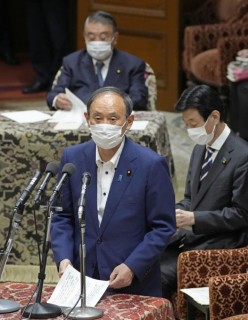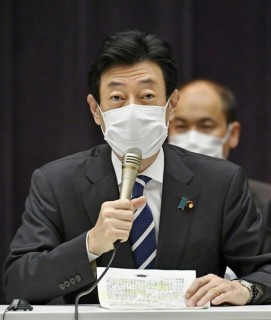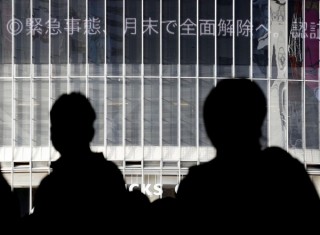Loading
Search
▼ Japan Decides To End COVID-19 State Of Emergency As Cases Fall
- Category:Other
The Japanese government on Tuesday formally decided to lift the COVID-19 state of emergency covering Tokyo and 18 other prefectures, as well as the quasi-state of emergency in other areas, as infections have declined from their peak.
When the measures end on Thursday, it will be the first time since April 4 that none of the country's 47 prefectures has been under a state of emergency or quasi-state of emergency.
"The number of new coronavirus cases and patients with severe symptoms have dramatically declined," Suga said at a committee meeting at the House of Representatives.
"We will enhance social response to the spread of infections through vaccinations and health care system enhancement among other steps and work on balancing antivirus measures and restoring normal lives," he said.
When the measures end on Thursday, it will be the first time since April 4 that none of the country's 47 prefectures has been under a state of emergency or quasi-state of emergency.
"The number of new coronavirus cases and patients with severe symptoms have dramatically declined," Suga said at a committee meeting at the House of Representatives.
"We will enhance social response to the spread of infections through vaccinations and health care system enhancement among other steps and work on balancing antivirus measures and restoring normal lives," he said.
The emergency and quasi-state of emergency, with the latter covering eight prefectures, will be allowed to expire, following several extensions, after an expert panel gave the green light to the planned easing of restrictions.
The government plans on easing restrictions in stages, with the governors of each prefecture deciding on which antivirus measures should remain and what should be lifted.
"Serving alcohol will be made possible, but governors will decide on that appropriately," Yasutoshi Nishimura, the minister in charge of Japan's coronavirus response, said at an experts' panel meeting.
Under the state of emergency, people are urged to refrain from nonessential outings and avoid going to crowded places, while restaurants are asked to close by 8 p.m. and not to serve alcohol.
For about a month after the state of emergency is lifted, the central government will continue to ask restaurants and drinking establishments to close by 8 p.m. and those taking sufficient antivirus measures by 9 p.m.
The government plans on easing restrictions in stages, with the governors of each prefecture deciding on which antivirus measures should remain and what should be lifted.
"Serving alcohol will be made possible, but governors will decide on that appropriately," Yasutoshi Nishimura, the minister in charge of Japan's coronavirus response, said at an experts' panel meeting.
Under the state of emergency, people are urged to refrain from nonessential outings and avoid going to crowded places, while restaurants are asked to close by 8 p.m. and not to serve alcohol.
For about a month after the state of emergency is lifted, the central government will continue to ask restaurants and drinking establishments to close by 8 p.m. and those taking sufficient antivirus measures by 9 p.m.
However, they will no longer be asked to refrain from serving alcohol.
Nishimura said such shortening of opening hours will be eased gradually and that businesses that continue to comply with such requests will receive financial support from the government.
He also said the maximum number of spectators allowed for major sporting events will be raised to 10,000 or 50 percent of the venue's capacity from the current 5,000 once the emergency statuses are lifted.
Infections across Japan have been falling since hitting a nationwide record of 25,876 cases on Aug. 20. A total of 1,147 cases were confirmed on Monday, with infections in Tokyo falling below 200 for the first time since March.
Tokyo was placed under its latest state of emergency on July 12, about a week before the opening of the Olympics, joining Okinawa, the only other area then subject to the measure. Other prefectures, including Osaka and Fukuoka, were placed under it in August.
The decision to lift the state of emergency comes a day before the ruling Liberal Democratic Party selects a new leader to succeed Suga, who announced his intent to resign earlier this month.
"Thanks to the cooperation of many people, I can lift the state of emergency during my tenure," said Suga at an LDP gathering in the morning.
But Japan still faces the risk of another wave of infections hitting the country as winter approaches.
Nishimura said at the panel meeting if the number of infections was to rise again, the government will take necessary measures, including implementing a quasi-state of emergency.
The health ministry has also been reviewing the country's stretched health care system, aiming to increase the number of temporary facilities to look after COVID-19 patients and secure enough medical personnel in addition to asking existing medical institutions to have more hospital beds available for coronavirus patients.
Nishimura said such shortening of opening hours will be eased gradually and that businesses that continue to comply with such requests will receive financial support from the government.
He also said the maximum number of spectators allowed for major sporting events will be raised to 10,000 or 50 percent of the venue's capacity from the current 5,000 once the emergency statuses are lifted.
Infections across Japan have been falling since hitting a nationwide record of 25,876 cases on Aug. 20. A total of 1,147 cases were confirmed on Monday, with infections in Tokyo falling below 200 for the first time since March.
Tokyo was placed under its latest state of emergency on July 12, about a week before the opening of the Olympics, joining Okinawa, the only other area then subject to the measure. Other prefectures, including Osaka and Fukuoka, were placed under it in August.
The decision to lift the state of emergency comes a day before the ruling Liberal Democratic Party selects a new leader to succeed Suga, who announced his intent to resign earlier this month.
"Thanks to the cooperation of many people, I can lift the state of emergency during my tenure," said Suga at an LDP gathering in the morning.
But Japan still faces the risk of another wave of infections hitting the country as winter approaches.
Nishimura said at the panel meeting if the number of infections was to rise again, the government will take necessary measures, including implementing a quasi-state of emergency.
The health ministry has also been reviewing the country's stretched health care system, aiming to increase the number of temporary facilities to look after COVID-19 patients and secure enough medical personnel in addition to asking existing medical institutions to have more hospital beds available for coronavirus patients.
- September 28, 2021
- Comment (0)
- Trackback(0)




